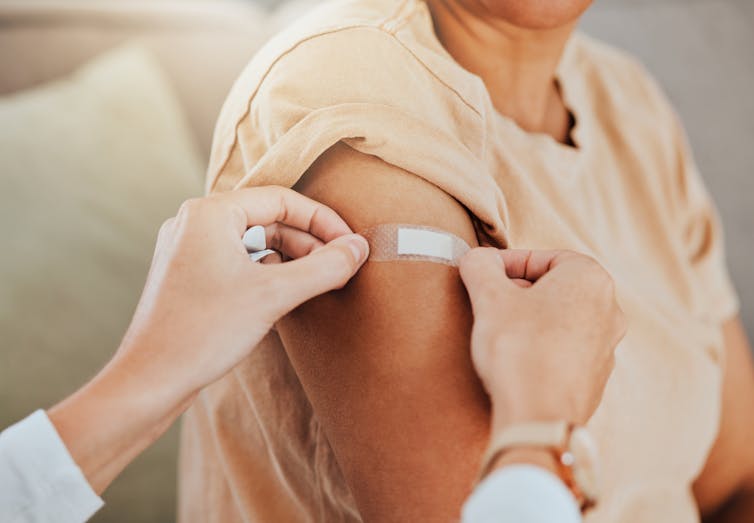Supamotion/Shutterstock
COVID vaccines call our immune systems to action, generating antibodies which fight against any contact we have with the virus. Antibodies help to reduce the effects of an infection or even prevent it altogether. Scientists have estimated that vaccination has averted millions of COVID deaths worldwide.
Studies have also shown the chances of having long-term or ongoing symptoms (“long COVID”) are significantly reduced for anyone who does catch COVID after being vaccinated.
While vaccination provides effective protection, the immunity generated by COVID vaccines wanes in the months afterwards. The coronavirus has also continued to evolve over time, with more recent delta and omicron variants better at avoiding the body’s defences than earlier forms of the virus. With this in mind, many countries around the world have rolled out booster (third) doses.
In our new study, my colleagues and I wanted to know how effective first booster vaccines were at generating antibodies. We were particularly keen to understand how those people most vulnerable to COVID responded to the first booster, as these groups mounted a smaller immune response after the first and second doses.
We found the first booster increased antibody levels across the board, bringing the most vulnerable groups closer in line with the rest of the population.
What we did
We worked with more than 9,000 participants from two long-term UK-based research studies, TwinsUK and Children of the 90s. We asked participants to use home testing kits to take their own blood samples, which they then posted to a laboratory for testing. We also asked them to complete surveys about their health and experiences throughout the pandemic, which we used in our analysis.
In the blood samples, we measured the levels of antibodies that act against the “spike” protein part of the coronavirus. These “anti-spike” antibodies represent one of the antibody types generated following COVID vaccination. The level of these antibodies in the blood is linked to how much protection we have against future infection (people with higher levels tend to have a lower risk of infection than those with lower levels).
In our analysis, we found large increases in antibody levels with each vaccine dose. Participants who had received a first booster had a ten-fold higher level of antibodies on average, compared with people who had only received two doses, with the second dose around six months earlier.
Read more:
Five reasons why young people should get a COVID booster vaccine
When comparing antibody levels between groups of people, we did see that certain groups identified as more vulnerable to COVID (such as those advised to “shield” or with suppressed immune systems) had lower levels after a first or second dose. This has been demonstrated in other research.
However, we found this difference was lessened after a first booster. The majority of these more vulnerable people mounted a strong response to the booster, similar in scale to other study participants.
The exact reasons for this are not yet known. Studies have shown that repeated exposure to coronavirus, through vaccination or infection, improves the strength and breadth of the immune response. So this may help to explain why the antibody levels of more vulnerable people “take off” after a booster. But we need more research to understand this effect.

PeopleImages.com – Yuri A/Shutterstock
Some limitations
We note that our study has certain limitations. Our sample size was limited for some groups, and the participants in our study were more likely to be older, female, and identify as being of white ethnicity, compared with the UK population overall.
Geographically, TwinsUK participants were more likely to live in more affluent areas, and in the south-east of England. Children of the 90s follows children born in Bristol and surrounding areas and their parents, and so participants tended to live in south-west England.
Further work is needed to generalise our findings to UK racial groups who don’t identify as white, and other international populations. We also note that the antibodies we measured are only one part of the wider immune system, and immune response varies between people.
Read more:
COVID vaccines: many people have had two doses but not their boosters – here’s why that might be
The importance of getting boosted
Our study provides further evidence that coming forward for a booster vaccination is a good idea, particularly as COVID is still going around. It also shows the significant benefit of booster doses for people in higher-risk groups.
After the rollout of first and second doses in the first half of 2021 in the UK, a first booster vaccination was offered from September 2021, followed by a second seasonal autumn booster dose starting in September 2022 for certain groups.
But take-up of booster jabs has been lower than first and second doses. While 88% of people in the UK aged 12 or above have received the first two doses, only 70% have also had the first booster.
The first booster is available to anyone aged 16 and over, plus at-risk children aged 12 to 15. The current autumn booster is available to everyone over 50 and some younger people who are at higher risk. However, reports indicate these boosters will stop being offered on February 12, making it particularly pressing that those who have not yet received a booster come forward.
To book a COVID vaccination, visit the NHS website or contact your local GP practice.
![]()
Nathan Cheetham receives funding from The National Institute for Health and Care Research.











